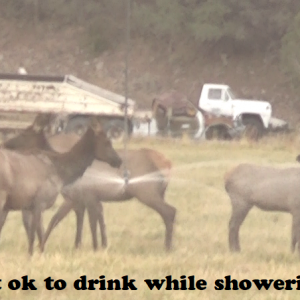202typical
Long Time Member
- Messages
- 3,123
Blame Clinton And The Greens For Gas Prices
By Henry Lamb
April 28, 2008
With gas prices now yon-side of $3.50 per gallon, wouldn't it be great to have an extra million barrels of domestic oil flowing daily into the American pipeline? Blame William Jefferson Clinton, who vetoed a bill in 1995 that would have opened the Alaska reserves that could have been producing much needed domestic energy today.
Blame the green environmental extremists who block every effort to expand domestic energy supply, whether in off-shore oil reserves, expansion of clean coal production, or the construction of new nuclear energy facilities. It's just plain dumb to allow the shortage of readily available energy to drive prices so high that the entire economy and food supply are in jeopardy.
The fear-mongering extremists bring up the "global warming" hobgoblin every time a new initiative is introduced to increase the energy supply. Atmospheric carbon dioxide from human activity makes little or no difference to the climate.
The one thing on which scientists agree is that atmospheric carbon dioxide is currently about 375 parts-per-million. Eighty percent of this carbon is naturally occurring, and would be in the atmosphere had oil never been discovered. The remaining 20 percent, or about 75ppm, is generally attributed to all the smoke-stacks and automobiles and lawn mowers that humans have created.
Could all man-made carbon dioxide produced by humans be eliminated from the atmosphere, the difference would be undetectable. Visualize an Olympic-size swimming pool containing the standard 660,253.9 gallons of water. (web site) The average depth would be 7.480 feet. Remove the percentage of water equal to man-made carbon dioxide in the atmosphere, and the new average depth of the pool would be 7.452 feet. Undetectable!
A reduction of 75ppm of carbon dioxide in the atmosphere would make no difference on any thermometer. And it would take total elimination of all man-made carbon dioxide to achieve this number. The Kyoto Protocol, had it been fully implemented, would have reduced carbon dioxide by only about 1ppm.
These results are simply not worth banning the use of fossil fuels.
Environmental extremists prefer to mandate the expanded use of ethanol, rather than using abundant oil supplies. This alternative produces less energy per gallon of fuel than gasoline, while driving the price of food upward, causing riots, (web site) and forcing the cultivation of more land where wildlife can no longer flourish.
Environmental extremists wring their hands and cry crocodile tears at the thought of "ruining" the Alaska National Wildlife Refuge by using only 2000 of the 18 million acres for oil production. But they seem to have no problems with the idea of covering millions of acres in the southwest with solar panels.
Environmental extremists celebrate their victory in banning DDT to save birds. But they have no problem with miles and miles of wind turbines that slaughter millions of birds every year. Nor do they seem to have any sympathy for the millions of people who have died from malaria as a direct result of the ban on DDT.
Big oil is not to blame for the high price of gasoline; the blame must fall squarely in the lap of the environmental extremists who use propaganda and fear-mongering to block the increases in the production of readily available fossil fuels. There are sufficient reserves of coal to last about 200 years. Despite Jimmy Carter's 1970s declaration that the world would be out of oil by 2000, and considering the anticipated increase in demand, there are enough known oil reserves to last at least 60 years. This energy should be available now.
Of course, research should continue to find abundant, affordable energy supplies for the future. But forcing technology to advance by arbitrarily and unnecessarily prohibiting the use of currently-available energy supplies makes no sense. The price of both existing supplies and alternative technology is artificially increased. To write this foolishness into law is even worse.
Every time government sticks its nose into the market place and attempts to manage it, government makes a mess. The ethanol mandate, for example, inevitably results in price increases for food - for everyone. The arbitrary increase in fuel efficiency standards inevitably results in smaller, lighter automobiles - and more crash-related deaths. The much touted cap-and-trade program for carbon emissions will inevitably result in taking money out of the pockets of wage-earners, and transfer it to the pockets of people like Al Gore, who created the "hot-air" store, and sells his goods only because government forces people to buy them.
Every time a person fills up at the pump, he should visualize the billions of barrels of oil that are waiting in Alaska, and the billions of barrels of oil that are waiting in the Dakotas and Montana, and the billions of barrels of oil that are waiting just off shore - and curse the environmental extremists who are forcing him to pay far more for his transportation than is necessary.
"Thanks climate PhD 202" - TFinalshot Feb-05-08, 02:16 PM (MST)
By Henry Lamb
April 28, 2008
With gas prices now yon-side of $3.50 per gallon, wouldn't it be great to have an extra million barrels of domestic oil flowing daily into the American pipeline? Blame William Jefferson Clinton, who vetoed a bill in 1995 that would have opened the Alaska reserves that could have been producing much needed domestic energy today.
Blame the green environmental extremists who block every effort to expand domestic energy supply, whether in off-shore oil reserves, expansion of clean coal production, or the construction of new nuclear energy facilities. It's just plain dumb to allow the shortage of readily available energy to drive prices so high that the entire economy and food supply are in jeopardy.
The fear-mongering extremists bring up the "global warming" hobgoblin every time a new initiative is introduced to increase the energy supply. Atmospheric carbon dioxide from human activity makes little or no difference to the climate.
The one thing on which scientists agree is that atmospheric carbon dioxide is currently about 375 parts-per-million. Eighty percent of this carbon is naturally occurring, and would be in the atmosphere had oil never been discovered. The remaining 20 percent, or about 75ppm, is generally attributed to all the smoke-stacks and automobiles and lawn mowers that humans have created.
Could all man-made carbon dioxide produced by humans be eliminated from the atmosphere, the difference would be undetectable. Visualize an Olympic-size swimming pool containing the standard 660,253.9 gallons of water. (web site) The average depth would be 7.480 feet. Remove the percentage of water equal to man-made carbon dioxide in the atmosphere, and the new average depth of the pool would be 7.452 feet. Undetectable!
A reduction of 75ppm of carbon dioxide in the atmosphere would make no difference on any thermometer. And it would take total elimination of all man-made carbon dioxide to achieve this number. The Kyoto Protocol, had it been fully implemented, would have reduced carbon dioxide by only about 1ppm.
These results are simply not worth banning the use of fossil fuels.
Environmental extremists prefer to mandate the expanded use of ethanol, rather than using abundant oil supplies. This alternative produces less energy per gallon of fuel than gasoline, while driving the price of food upward, causing riots, (web site) and forcing the cultivation of more land where wildlife can no longer flourish.
Environmental extremists wring their hands and cry crocodile tears at the thought of "ruining" the Alaska National Wildlife Refuge by using only 2000 of the 18 million acres for oil production. But they seem to have no problems with the idea of covering millions of acres in the southwest with solar panels.
Environmental extremists celebrate their victory in banning DDT to save birds. But they have no problem with miles and miles of wind turbines that slaughter millions of birds every year. Nor do they seem to have any sympathy for the millions of people who have died from malaria as a direct result of the ban on DDT.
Big oil is not to blame for the high price of gasoline; the blame must fall squarely in the lap of the environmental extremists who use propaganda and fear-mongering to block the increases in the production of readily available fossil fuels. There are sufficient reserves of coal to last about 200 years. Despite Jimmy Carter's 1970s declaration that the world would be out of oil by 2000, and considering the anticipated increase in demand, there are enough known oil reserves to last at least 60 years. This energy should be available now.
Of course, research should continue to find abundant, affordable energy supplies for the future. But forcing technology to advance by arbitrarily and unnecessarily prohibiting the use of currently-available energy supplies makes no sense. The price of both existing supplies and alternative technology is artificially increased. To write this foolishness into law is even worse.
Every time government sticks its nose into the market place and attempts to manage it, government makes a mess. The ethanol mandate, for example, inevitably results in price increases for food - for everyone. The arbitrary increase in fuel efficiency standards inevitably results in smaller, lighter automobiles - and more crash-related deaths. The much touted cap-and-trade program for carbon emissions will inevitably result in taking money out of the pockets of wage-earners, and transfer it to the pockets of people like Al Gore, who created the "hot-air" store, and sells his goods only because government forces people to buy them.
Every time a person fills up at the pump, he should visualize the billions of barrels of oil that are waiting in Alaska, and the billions of barrels of oil that are waiting in the Dakotas and Montana, and the billions of barrels of oil that are waiting just off shore - and curse the environmental extremists who are forcing him to pay far more for his transportation than is necessary.
"Thanks climate PhD 202" - TFinalshot Feb-05-08, 02:16 PM (MST)












